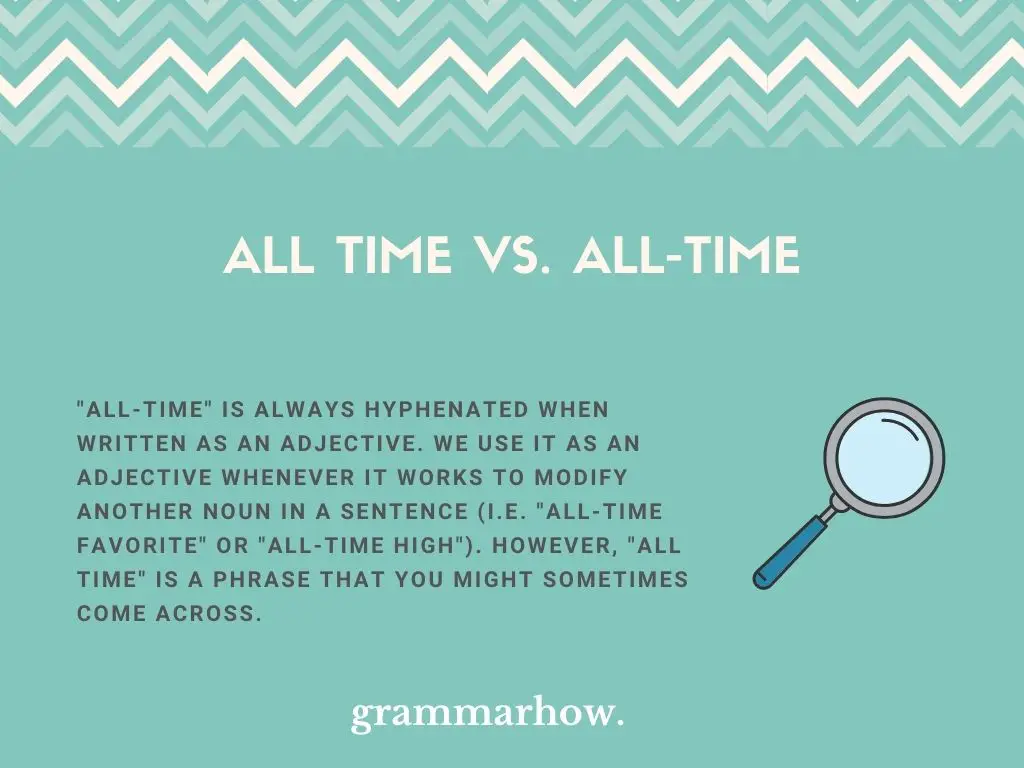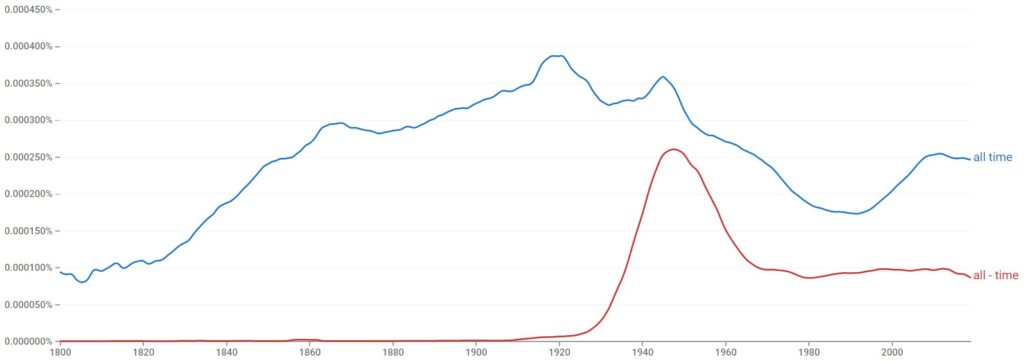“All-time” is a common adjective that you’ll come across. That’s why it’s helpful for you to read this article to learn whether it should be a hyphenated word or whether it’s fine to write it as one or two words. We’ll answer any questions you might have.
All time vs. All-time
“All-time” is always hyphenated when written as an adjective. We use it as an adjective whenever it works to modify another noun in a sentence (i.e. “all-time favorite” or “all-time high”). However, “all time” is a phrase that you might sometimes come across.

According to Google Ngram Viewer, “all time” is the more popular choice of the two. However, “all-time” is the officially recognized spelling variation of the adjective form.

The only reason that “all time” is more popular on the graph above is because of sentences like this:
- That was the most fun of all time.
These sentences can be quite common, which skews the result of the graph. However, “all time” is incorrect as an adjective.
In The Cambridge Dictionary and The Oxford Dictionary, “all-time” is the only defined variation you can use. It always has the hyphen in it, and both dictionaries state that it is an adjective whenever used in this manner.
All time
“All time” is incorrect when using it as an adjective. Since this article focuses on hyphens and how adjectives interact with them, we thought it would make the most sense to show that this is not the correct form (even though it is still a correct phrase).
There is nothing wrong with using “all time” in other situations. The following examples are correct:
- This is the worst of all time.
- Here he is, for all time to study.
As a phrase, it can be used as two words. However, this article is not looking at the phrasal form, so we cannot use it in this way.
Instead, we want it to be an adjective, so it might help to refer to the following examples:
- Correct: My all-time favorite band is coming to my city, and I cannot wait to see them perform.
- Incorrect: The all time best restaurant in the state is closing!
- Correct: This is my all-time low moment. I can’t believe I’ve managed to get here.
- Incorrect: The all time record for the long jump is about three meters further than I have ever managed!
As you can see, when the noun comes after “all-time,” it’s always best to write it as a hyphenated form. This is common practice and follows all the standard English rules.
All-time
“All-time” should always be hyphenated when used as an adjective. We use the hyphen to group “all” and “time,” which are two independent words. The hyphen allows us to link the separate words to show that they modify the same noun.
According to the AP Stylebook guidelines, hyphens are linkers. We use them to group one or more words when the two words combine to modify the same noun. It helps us to establish where the modification comes from and what the meaning is expected to be.
Check out these examples if you’re still unsure:
- The all-time champion of this sport is retiring, which means it’s time for somebody else to take the trophy.
- My all-time favorite food has got to be something from the Indian place down the road.
- My all-time favorite country is the USA because I find there is so much culture there that a lot of people miss.
- This is an all-time high and a record number! Well done, team! You should all be proud of yourselves.
The hyphenated form of “all-time” is important whenever a noun comes after it. Make sure you remember to use a hyphen when grouping these two words. Otherwise, only “time” would modify the noun (which would make no sense).
Is “Time” Capitalized In The Word “All-Time”?
You do not need to capitalize either part of “all-time” when it is hyphenated. It is not a proper noun, so capitalization is irrelevant.
However, if you write it as part of a title, it might be wise to capitalize both parts. It’s up to you, as it’s very dependent on title style, but if every other word is capitalized, you should capitalize both parts of the hyphen to keep it standard.

Martin holds a Master’s degree in Finance and International Business. He has six years of experience in professional communication with clients, executives, and colleagues. Furthermore, he has teaching experience from Aarhus University. Martin has been featured as an expert in communication and teaching on Forbes and Shopify. Read more about Martin here.

